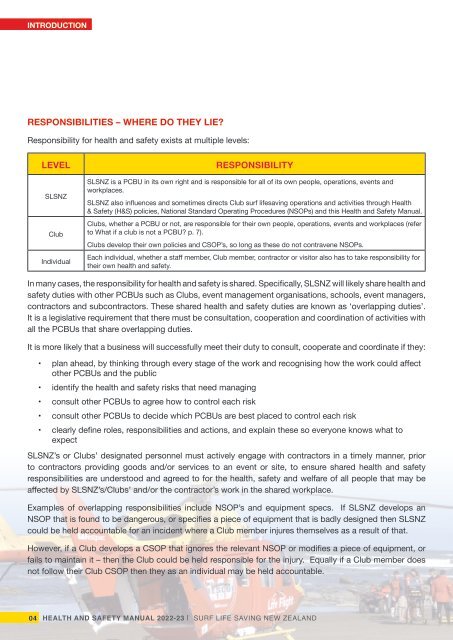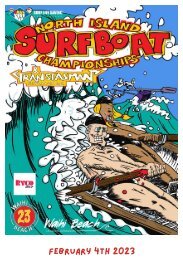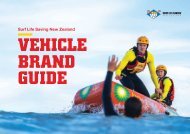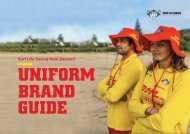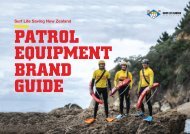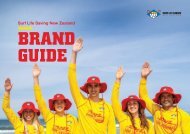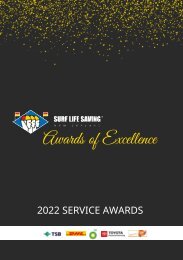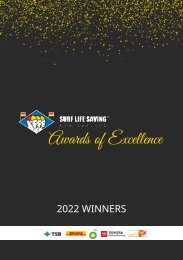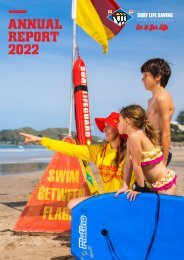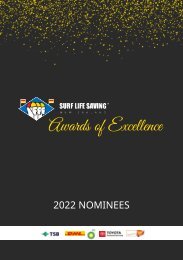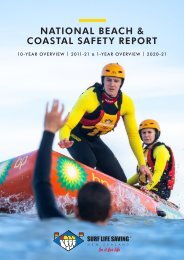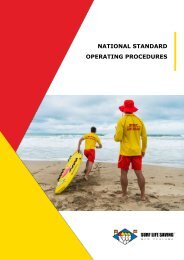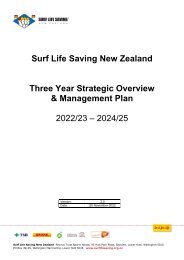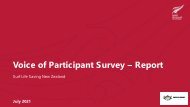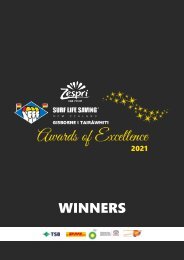SLSNZ Health and Safety Manual
Create successful ePaper yourself
Turn your PDF publications into a flip-book with our unique Google optimized e-Paper software.
SECTION INTRODUCTION NAME<br />
INTRODUCTION<br />
RESPONSIBILITIES – WHERE DO THEY LIE?<br />
Responsibility for health <strong>and</strong> safety exists at multiple levels:<br />
LEVEL<br />
<strong>SLSNZ</strong><br />
Club<br />
Individual<br />
RESPONSIBILITY<br />
<strong>SLSNZ</strong> is a PCBU in its own right <strong>and</strong> is responsible for all of its own people, operations, events <strong>and</strong><br />
workplaces.<br />
<strong>SLSNZ</strong> also influences <strong>and</strong> sometimes directs Club surf lifesaving operations <strong>and</strong> activities through <strong>Health</strong><br />
& <strong>Safety</strong> (H&S) policies, National St<strong>and</strong>ard Operating Procedures (NSOPs) <strong>and</strong> this <strong>Health</strong> <strong>and</strong> <strong>Safety</strong> <strong>Manual</strong>.<br />
Clubs, whether a PCBU or not, are responsible for their own people, operations, events <strong>and</strong> workplaces (refer<br />
to What if a club is not a PCBU? p. 7).<br />
Clubs develop their own policies <strong>and</strong> CSOP’s, so long as these do not contravene NSOPs.<br />
Each individual, whether a staff member, Club member, contractor or visitor also has to take responsibility for<br />
their own health <strong>and</strong> safety.<br />
In many cases, the responsibility for health <strong>and</strong> safety is shared. Specifically, <strong>SLSNZ</strong> will likely share health <strong>and</strong><br />
safety duties with other PCBUs such as Clubs, event management organisations, schools, event managers,<br />
contractors <strong>and</strong> subcontractors. These shared health <strong>and</strong> safety duties are known as ‘overlapping duties’.<br />
It is a legislative requirement that there must be consultation, cooperation <strong>and</strong> coordination of activities with<br />
all the PCBUs that share overlapping duties.<br />
It is more likely that a business will successfully meet their duty to consult, cooperate <strong>and</strong> coordinate if they:<br />
• plan ahead, by thinking through every stage of the work <strong>and</strong> recognising how the work could affect<br />
other PCBUs <strong>and</strong> the public<br />
• identify the health <strong>and</strong> safety risks that need managing<br />
• consult other PCBUs to agree how to control each risk<br />
• consult other PCBUs to decide which PCBUs are best placed to control each risk<br />
• clearly define roles, responsibilities <strong>and</strong> actions, <strong>and</strong> explain these so everyone knows what to<br />
expect<br />
<strong>SLSNZ</strong>’s or Clubs’ designated personnel must actively engage with contractors in a timely manner, prior<br />
to contractors providing goods <strong>and</strong>/or services to an event or site, to ensure shared health <strong>and</strong> safety<br />
responsibilities are understood <strong>and</strong> agreed to for the health, safety <strong>and</strong> welfare of all people that may be<br />
affected by <strong>SLSNZ</strong>’s/Clubs’ <strong>and</strong>/or the contractor’s work in the shared workplace.<br />
Examples of overlapping responsibilities include NSOP’s <strong>and</strong> equipment specs. If <strong>SLSNZ</strong> develops an<br />
NSOP that is found to be dangerous, or specifies a piece of equipment that is badly designed then <strong>SLSNZ</strong><br />
could be held accountable for an incident where a Club member injures themselves as a result of that.<br />
If a staff member of <strong>SLSNZ</strong> does not follow a <strong>SLSNZ</strong> policy or NSOP, then they as an individual may be held<br />
accountable.<br />
Where multiple parties are involved, it is always helpful to identify a ‘lead’ PCBU. For example, where<br />
<strong>SLSNZ</strong> leads the lifesaving work or activity, e.g., regional lifeguard assessment, an IRB competition, regional<br />
lifesaving sport competition, etc. where various Clubs <strong>and</strong>/or members participate, then <strong>SLSNZ</strong> is considered<br />
the lead PCBU. This way there is no confusion as to who is taking the lead on H&S with this activity, <strong>and</strong> it<br />
is less likely that the parties involved mistakenly assume someone else is looking after it.<br />
Additional information on overlapping duties can be found on worksafe.govt.nz<br />
WHAT IF A CLUB IS NOT A PCBU?<br />
Any Club who employs one or more individuals is considered a PCBU under the HSWA. As such, where a<br />
Club leads the surf lifesaving work or activity, e.g., volunteer patrol, Club lifeguard training, Club lifeguard<br />
sport training, Club rooky lifeguard training, etc., then the Club is considered the lead PCBU.<br />
Some Clubs do not have any employees, <strong>and</strong> may consider they do not meet the technical definition of the<br />
PCBU <strong>and</strong> therefore fall outside of the requirements of the HSWA. However, this does not mean that the<br />
Club does not have any responsibilities for health <strong>and</strong> safety!<br />
The Club still has a moral obligation for health <strong>and</strong> safety <strong>and</strong> there are also obligations under other pieces<br />
of legislation identified above (refer to p. 4), which are not dependent on a Club meeting the definition of a<br />
PCBU.<br />
In relation to the HSWA, the non-PCBU status does not take away the responsibility for taking all reasonable<br />
steps to look after the health <strong>and</strong> safety of members; rather, it provides some protection from prosecution if<br />
they are found to have failed in that obligation.<br />
Either way, <strong>SLSNZ</strong> strongly recommends Clubs take the approach that they are a PCBU <strong>and</strong> act accordingly.<br />
REPLACEMENT OF THE PATROL OPERATIONS MANUAL (POM)<br />
As of 30 September, 2020, the Patrol Operations <strong>Manual</strong> (POM) should not be used wherever there are<br />
NSOPs available <strong>and</strong> practicable for use. NSOPs take effect from 1 October, 2020. Additionally, Club/<br />
Service Operating Procedures (CSOPs), where available, will also take effect from 1 October, 2020.<br />
NSOPs in conjunction with CSOPs are the primary source of informing the procedures <strong>and</strong> practices for all<br />
workers, for all <strong>SLSNZ</strong> work. The continued development, review <strong>and</strong> implementation of NSOPs <strong>and</strong> CSOPs<br />
is part of <strong>SLSNZ</strong>’s commitment to continuously improve <strong>SLSNZ</strong>’s HSMS across all operations.<br />
However, if a Club develops a CSOP that ignores the relevant NSOP or modifies a piece of equipment, or<br />
fails to maintain it – then the Club could be held responsible for the injury. Equally if a Club member does<br />
not follow their Club CSOP then they as an individual may be held accountable.<br />
04 HEALTH AND SAFETY MANUAL 2022-23 | SURF LIFE SAVING NEW ZEALAND<br />
SURF LIFE SAVING NEW ZEALAND | HEALTH AND SAFETY MANUAL 2022-23<br />
05


